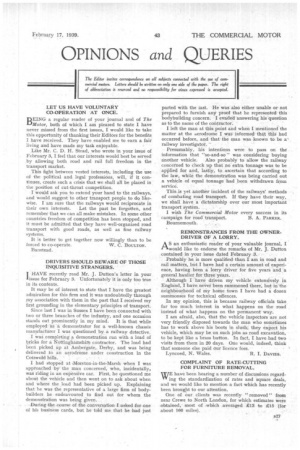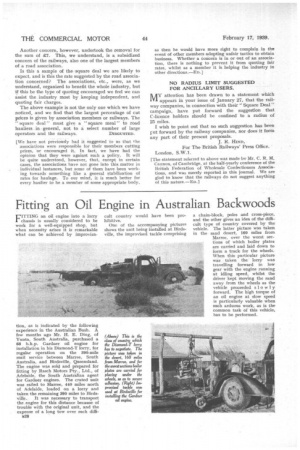OPINIONS and QUERIES
Page 37

Page 38

If you've noticed an error in this article please click here to report it so we can fix it.
LET US HAVE VOLUNTARY CO-OPERATION AT ONCE. BEING a regular reader of your journal and of The "Motor, both of which I am pleased to state I have never missed from the first issues, I would like to take this opportunity of thanking their Editors for the benefits. I have received. They have enabled me to earn a fair living and have made my task enjoyable.
Like Mr. C. D. H. Stead, who wrote in your issue of February 3, I feel that our interests would best be served by allowing both road and rail full freedom in the transport market.
This fight between vested interests, including the use of the political and legal professions, will, if It continues, create such a crisis that we shall all be placed in the position of cut-throat competition.
I would ask you to extend your hand to the railways, and would suggest to other transport people to do likewise. I am sure that the railways would reciprocate in their own interests. Let the past be forgotten, and remember that we can all make mistakes. In some other countries freedom of competition has been stopped, and it must be admitted that they have well-organized road transport with good roads, as well as fine railway systems.
It is better to get together now willingly than to be
forced to co-operate. W. C. BOULTON. Banstead.
DRIVERS SHOULD BEWARE OF THOSE INQUISITIVE STRANGERS.
' HAVE recently read Mr. J. Dutton's letter in your issue for February 3. Unfortunately it is only too true in its contents.
It may be of interest to state that I have the greatest admiration for this firm and it was undoubtedly through my association with them in the past that I received my first grounding in the elementary principles of transport.
Since last I was in Sussex I have been connected with two or three branches of the industry, and one occasion stands out prominently in my mind. It is that while employed as a demonstrator for a well-known chassis manufacturer I was questioned by a railway detective.
I wai completing a demonstration run with a load of bricks for a Nottinghamshire contractor. The load had been picked up at Arnbergate, Derby, and was being deliveied to an aerodrome under construction in the
Cotswold hills. ' • •
I had stopped at ,Moreton-in-the-Marsh when I was approached by the man concerned, who, incidentally, was riding in an expensive car. First, he questioned me about the vehicle and then went on to ask about when and where the load had been picked up. Explaining that he was the representative of a large firm of bodybuilders he endeavoured to find out for whom the demonstration was being given.
During the course of the conversation I asked for one of his business cards, but he told me that he had just
parted with the last. He was also either unable or not prepared to furnish any proof that he represented this bodybuilding concern. I evaded 'answering his question as to the name of the contractor.
I left the man at this point and when I mentioned the matter at the aerodrome I was informed that this had occurred before, and that the man was known to be arailway investigator.
Presumably, his intentions were to pass on the information that "so-and-so" was considering buying another vehicle. Also probably to allow the railway concerned to check up that no extra tonnage was to be apPlied for and, lastly, to ascertain that according to the law, while the demonstration was being carried out a vehicle of equal tonnage had been withdrawn from service.
This.is yet another incident of the railways' methods of combating road transport. If they have their way, we shall have a dictatorship over our most important transport system.
I wish The Commercial Motor every success in its campaign for road transport. B. A. PARKER.
Bournemouth.
REMONSTRANCES FROM THE OWNERDRIVER OF A LORRY.
AS an enthusiastic reader of your valuable journal, I would like to endorse the remarks of Mr. J. Dutton contained in your issue dated February 3.
Probably he is more qualified than I am in road and rail matters, but I have had a certain amount of experience, having been a lorry driver for five years and a general haulier for three years.
Although I have driven my vehicle extensively in England, I have never been summoned there, but in the neighbourhood of my home town I have had a dozen summonses for technical offences.
In my opinion, this is because railway officials take far too much interest in what happens on the road instead of what happens on the permanent way.
I am afraid, also, that the vehicle inspectors are not very friendly disposed towards the man who sometimes has to work above his boots in slush; they expect his vehicle, which may be on such jobs as road excavation, to be kept like a brass button. In fact, I have had two visits from them in 20 days. One would, indeed, think that someone else paid Our licence fees.
Lyncoed, N. Wales. R. I. DAVIES.
COMPLAINT OF RATE-CUTTING FOR FURNITURE REMOVAL.
WE have been hearing a number of discussions regardvv ing the standardization of rates and square deals, and we would like to mention a fact which has recently been brought to our attention.
One of our clients was recently " removed " from near Crewe to North London, for which estimates were obtained, most of ,which averaged £13 to 415 (for about 160 miles).
Another concern, however, undertook the removal for the sum of £7. This, we understand, is a subsidized concern of the railways, also one of the largest members of a road association.
Is this a sample of the,square deal we are likely to expect, and is this the rate suggested by the road association concerned? The associations, etc., were, as we understand, organized to benefit the whole industry, but if this be the type of quoting encouraged we feel we can assist the industry most by keeping independent, and quoting fair charges.
The above example is not the only one which we have noticed, and we find that the largest percentage of cut prices is given by association members or railways. The " square deal" must give a "square meal" to road hauliers in general, not to a select number of large
operators and the railways. DISGUSTED.
[We have not previously had it suggested to us that I he associations were responsible for their members cutting prices, or encouraged it. In fact, we have had the opinion that they were against such a policy. It will be quite understood, however, that, except in certain cases, the associations have not gone into this matter in individual instances, but some of them have been working towards something like a general stabilization of rates for haulage. To our mind, it is much better for every haulier to be a member of some appropriate body,
as then he would have more right to complain in the event of other members adopting unfair tactics to obtain business. Whether a concern is in or out of an association, there is nothing to prevent it from quoting fair rates, whilst as a member it is helping the industry in other directions—En.] NO RADIUS LIMIT SUGGESTED FOR ANCILLARY USERS.
WAY attention has been drawn to a statement which IYI appears in your issue of January 27, that the railway companies, in connection with their "Square Deal" campaign, have put forward the suggestion that C-licence holders should be confined to a radius of 25 miles.
I wish to point out that no such suggestion has been put forward by the railway companies, nor does it form any part of their present proposals.
For The British Railways' Press Office. London, S.W.1.
[The statement referred to above was made by Mr. C. R. M. Cannon, of Cambridge, at the half-yearly conference of the British Federation of Wholesale Confectioners Associations, and was merely reported in this journal. We are glad to know that the railways do not suggest anything of this nature.—Eo.1




















































































